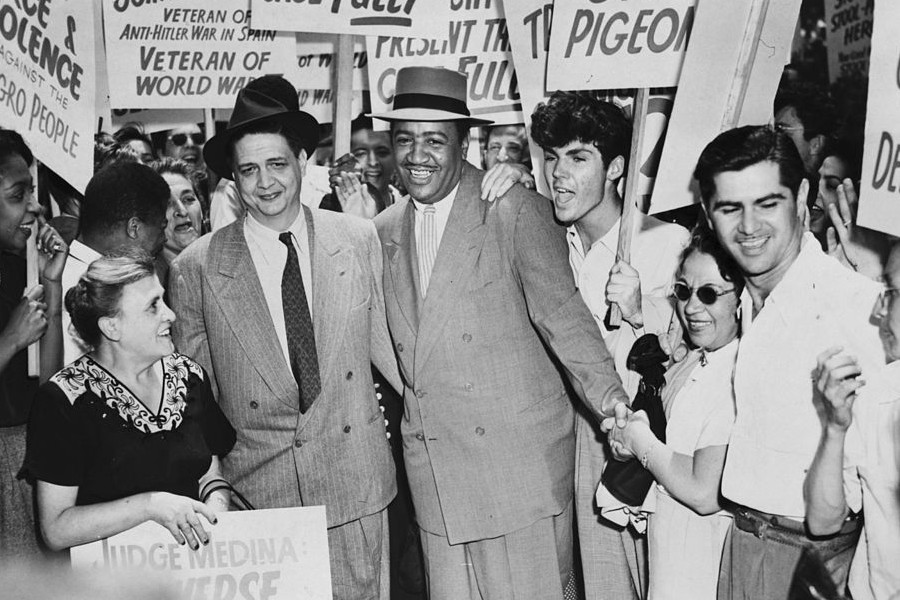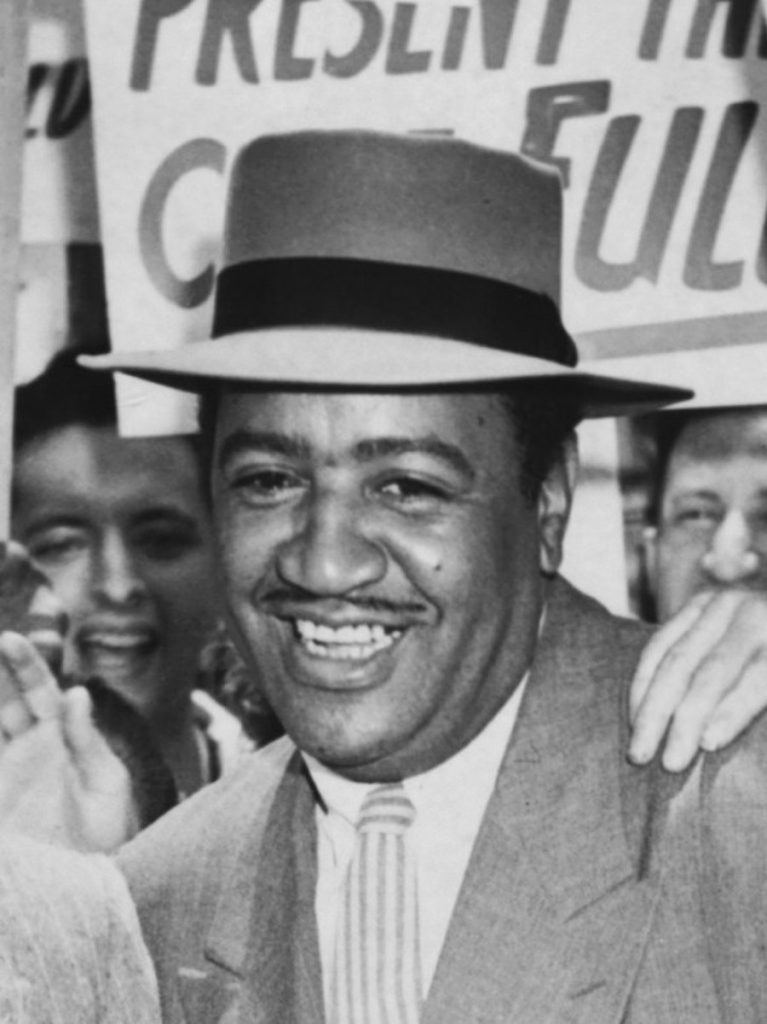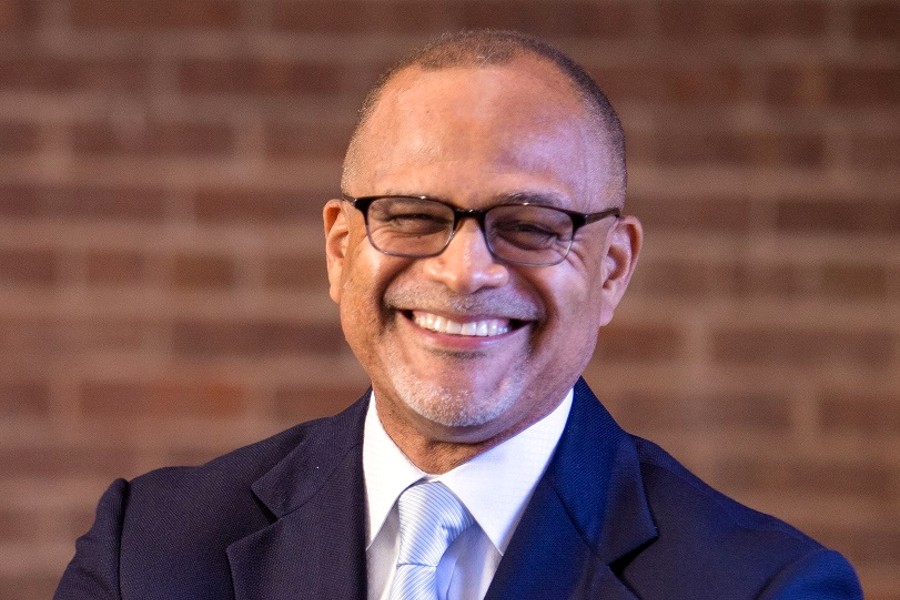
Benjamin Jefferson Davis Jr., September 8, 1903 – August 22, 1964, was a Harlem lawyer and communist who was elected in 1943 to the NYC Council, representing Harlem.
He faced increasing opposition from outside Harlem after the end of World War II. In 1949 he was among a number of communist leaders prosecuted for violating the Smith Act. He was convicted and sentenced to five years in prison.
Early years
Benjamin J. Davis Jr. – known to his friends as “Ben” – was born September 8, 1903, in Dawson, Georgia to Benjamin Davis, Sr. and Jimmie W. Porter. The family moved to Atlanta in 1909, where Davis’s father, “Big Ben” Davis, established a weekly black newspaper, the Atlanta Independent. It was successful enough to provide a comfortable middle-class upbringing for his family. The elder Benjamin Davis emerged as a prominent black political leader and served as a member of the Republican National Committee for the state of Georgia.
The younger Ben Davis Jr. attended the high school program of Morehouse College in Atlanta. He left the South to study at Amherst College, where he earned his B.A. in 1925. Davis continued his education at Harvard Law School, from which he graduated in 1929. Davis worked briefly as a journalist before starting a law practice in Atlanta in 1932.
Political career
Davis became radicalized through his role as defense attorney in the 1933 trial of Angelo Herndon, a 19-year-old black Communist who had been charged with violating a Georgia law against “attempting to incite insurrection”, because he tried to organize a farm workers’ union. Davis asked the International Juridical Association to review his brief. During the trial, Davis faced angry, racist opposition from the judge and public. He was impressed with the rhetoric and bravery of Herndon and his colleagues. After giving concluding arguments, he joined the Communist Party himself.
Herndon was convicted and sentenced to 18–20 years in jail. He was freed after April 26, 1937 when, by a 5-to-4 margin, the United States Supreme Court ruled Georgia’s Insurrection Law to be unconstitutional.
Davis moved to Harlem, New York in 1935, joining the Great Migration of blacks out of the South to northern cities. He worked as editor of the Communist Party’s newspaper targeted to African-Americans, The Negro Liberator. He later became editor of the CPUSA’s official English-language daily, The Daily Worker.
In 1943, Davis was elected under the then-used system of proportional representation to fill a city council seat being vacated by Adam Clayton Powell Jr. to run for Congress. Davis was reelected in 1945, this time to a four-year term.
Davis lost his 1949 bid for re-election due to several factors. First, two years earlier, New York had ceased to use proportional representation and Harlem was broken up into three districts, diluting the black vote. Second, Davis’s opponent in the new 21st district was journalist Earl Brown, a fusion candidate for the Democratic, Republican, and Liberal partie Finally, in July 1948, Davis was charged with conspiring to overthrow the federal government under the Smith Act – a World War II-era charge that rested on Davis’s association with the Communist Party.
He was tried along with eleven other defendants for their communist beliefs and party affiliation in the Smith Act trials. Paul Robeson, noted actor, singer, and civil rights activist publicly advocated for Davis and his fellow defendants. His conviction was announced on October 13, only a few weeks before the election.
Related: Communist Councilman from Harlem: Autobiographical Notes Written in a Federal Penitentiary.
With only a month remaining in his last term, Davis was expelled from the city council, a requirement under state law. His former colleagues even passed a resolution celebrating his ouster. He appealed his conviction for two years to the Supreme Court of the United States, without success. On March 1, 1955, after serving three years and four months in the federal penitentiary in Terre Haute, Indiana, Davis was freed. However, he was immediately transferred to the Allegheny County Jail in Pittsburgh, Pennsylvania, to serve an additional 60-day term for contempt of court.
He had appeared there in 1953 as a defense witness for another group of five Communists charged under the Smith Act, but was asked and refused to answer questions about unrelated individuals involved in the Communist Party’s National Commission of Negro Work. In 1957, the Supreme Court revisited the Smith Act and reversed itself in Yates v. United States, which held that the First Amendment protected radical and reactionary speech, unless it posed a “clear and present danger.”
In subsequent years, Davis engaged in a speaking tour of college campuses and remained politically active, promoting an agenda of civil rights and economic populism. Davis’ 1962 speaking circuit drew crowds at schools such as Harvard, Columbia, Amherst, Oberlin and the University of Minnesota. But the City College of New York – in the New York council district he represented in the 1940s – barred Davis from speaking on its campus in this period. After a student protest, Davis was allowed to speak outside, on the street.
He was close to Communist Party chairman William Z. Foster. Davis continued to publicly defend the actions of the Soviet Union, including the Soviet invasion of Hungary in 1956.

In 1962 Davis was charged with violating the Internal Security Act.
He died shortly before the case came to trial.
Death
Ben Davis died of lung cancer in New York City on August 22, 1964. He was less than one month shy of his 61st birthday at the time of his death, and was in the midst of a campaign for New York State Senate on the People’s Party ticket.
Legacy
While in prison, Davis had written notes for a memoir. These were confiscated by prison authorities and not released until after his death. They were posthumously published under the title Communist Councilman From Harlem (1969), with a foreword by his Smith Act codefendant Henry Winston
Photo credit: 1-2) Robert Thompson and Benjamin Davis surrounded by pickets as they leave the Federal Courthouse in New York City / World Telegram & Sun photo by C.M. Stieglitz.
Become a Harlem Insider!
By submitting this form, you are consenting to receive marketing emails from: Harlem World Magazine, 2521 1/2 west 42nd street, Los Angeles, CA, 90008, https://www.harlemworldmagazine.com. You can revoke your consent to receive emails at any time by using the SafeUnsubscribe® link, found at the bottom of every email. Emails are serviced by Constant Contact








